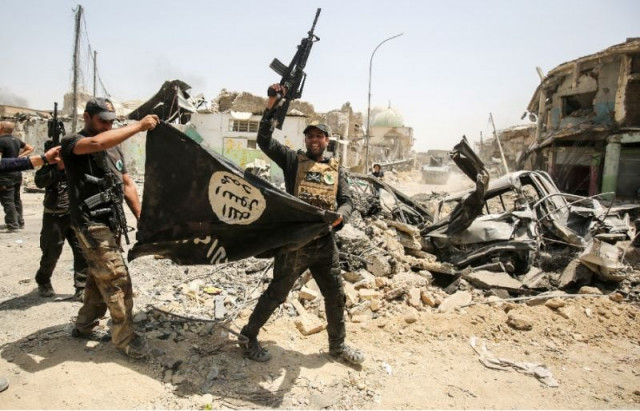'Caliphate' dream in tatters but IS not dead yet
Less than four years after sweeping offensive stunned the world, IS has lost almost all of the territory it controlled

Members of the Iraqi forces cheer as they carry an upside-down flag of the Islamic State (IS) group in Mosul. PHOTO: AFP
The Islamic State militant group may not be dead yet but its dream of statehood has already been buried, analysts say.
No one in IS "will now think of imposing 'the territory of the caliphate'," said Hisham al-Hashemi, an Iraqi specialist on extremist movements.
In 2014, self-proclaimed IS 'caliph' Abu Bakr al-Baghdadi ruled over seven million people in a territory as large as Italy encompassing large parts of Syria and nearly a third of Iraq.
Former ISIS brides say militants only want 'women and sex'
This new 'territory of Islam' - Dar al-Islam in Arabic - attracted thousands of militants from around the world, many accompanied by their wives and children.
The city of Raqa became the de facto Syrian capital, while Baghdadi made his only public appearance in a mosque in Mosul, Iraq's second largest city and once a major Middle East trading hub.
In all of the cities the group controlled, the black banner of IS flew above the buildings of a new administration.
Courts, hospitals and other official bodies even issued birth or marriage certificates or verdicts and other decrees on IS letterhead.
But less than four years after its sweeping offensive stunned the world, IS has lost almost all of the territory it controlled along with the precious income from oilfields that funded its activities.
Islamic State chief Baghdadi killed: Syrian Observatory
"In the course of recent battles, especially Mosul, a huge number of militants have died," said Kirk Sowell, publisher of Inside Iraqi Politics.
"Subsequent to that defeat, many others have surrendered or simply fled the country or are trying to melt into the population."
According to the US-led coalition fighting IS, the militants have lost 95 percent of the cross-border caliphate they declared in 2014.
Hashemi said that after suffering such heavy losses, "even what might remain of IS would not think of returning" to the idea of military and administrative control of territory.
And the routed group has been confined in Iraq to "four percent of the territory: wadis, oases and desert areas" without any population, along the porous border with Syria where it has also been cornered into an ever-tightening noose.
Islamic State Raqqa defeat 'may be today or tomorrow'
In addition to the Syrian and Iraqi armies, the remaining extremists face myriad forces backed by Russia, the United States or Iran, often at odds with each other over their differing regional interests.
"The caliphate project ran up against geopolitical realities," according to Karim Bitar of the Paris-based Institute of International and Strategic Affairs.
As a result, "the international militant galaxy is likely to revert to its previous strategy of de-territorialisation and revert to strikes against the 'distant enemy' in the West or Russia to show it must still be reckoned with," he added.
There is already a figurehead waiting in the wings.
IS was born of the ashes of the Islamic State of Iraq and the Levant and Al-Qaeda before it, and Hashemi said that despite the 'caliphate' going down in flames, a new organisation is beginning to emerge.
"Most veterans of IS and Al-Qaeda in Iraq are now regrouping in Syria" where militant groups still occupy many areas, he said.
These fighters - 'the most indoctrinated and most disciplined' - have since September been forming the "Ansar al-Furqan group, led by Hamza bin Laden", the son and would-be heir of Osama bin Laden.
The younger bin Laden has become active as an Al-Qaeda propagandist since his father's death at the hands of US special forces in 2011 in Pakistan.
In January, the United States added Hamza bin Laden to its terrorist blacklist.
His father may be dead, but the bin Laden name continues to attract recruits, Hashemi said.



















COMMENTS
Comments are moderated and generally will be posted if they are on-topic and not abusive.
For more information, please see our Comments FAQ